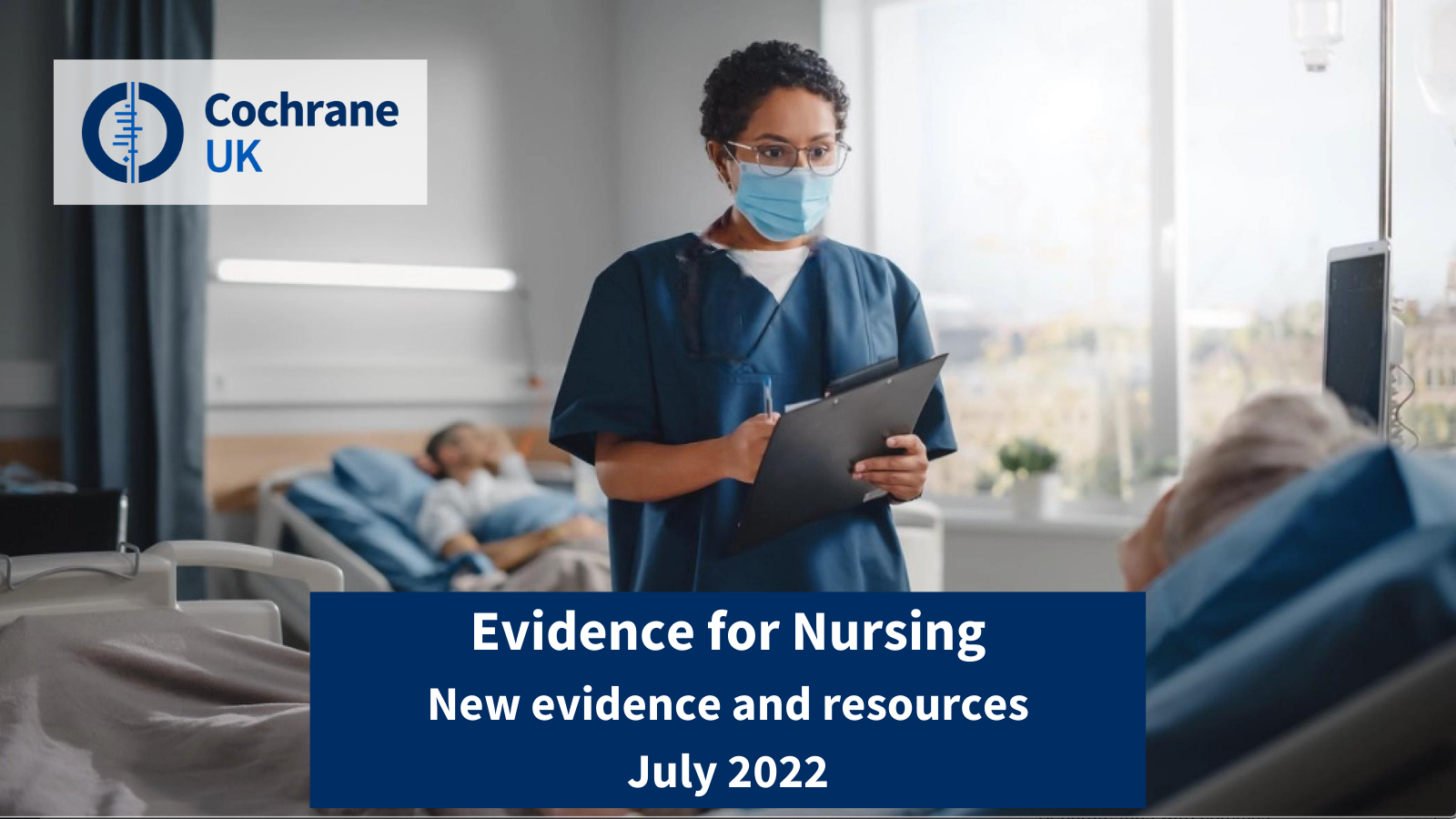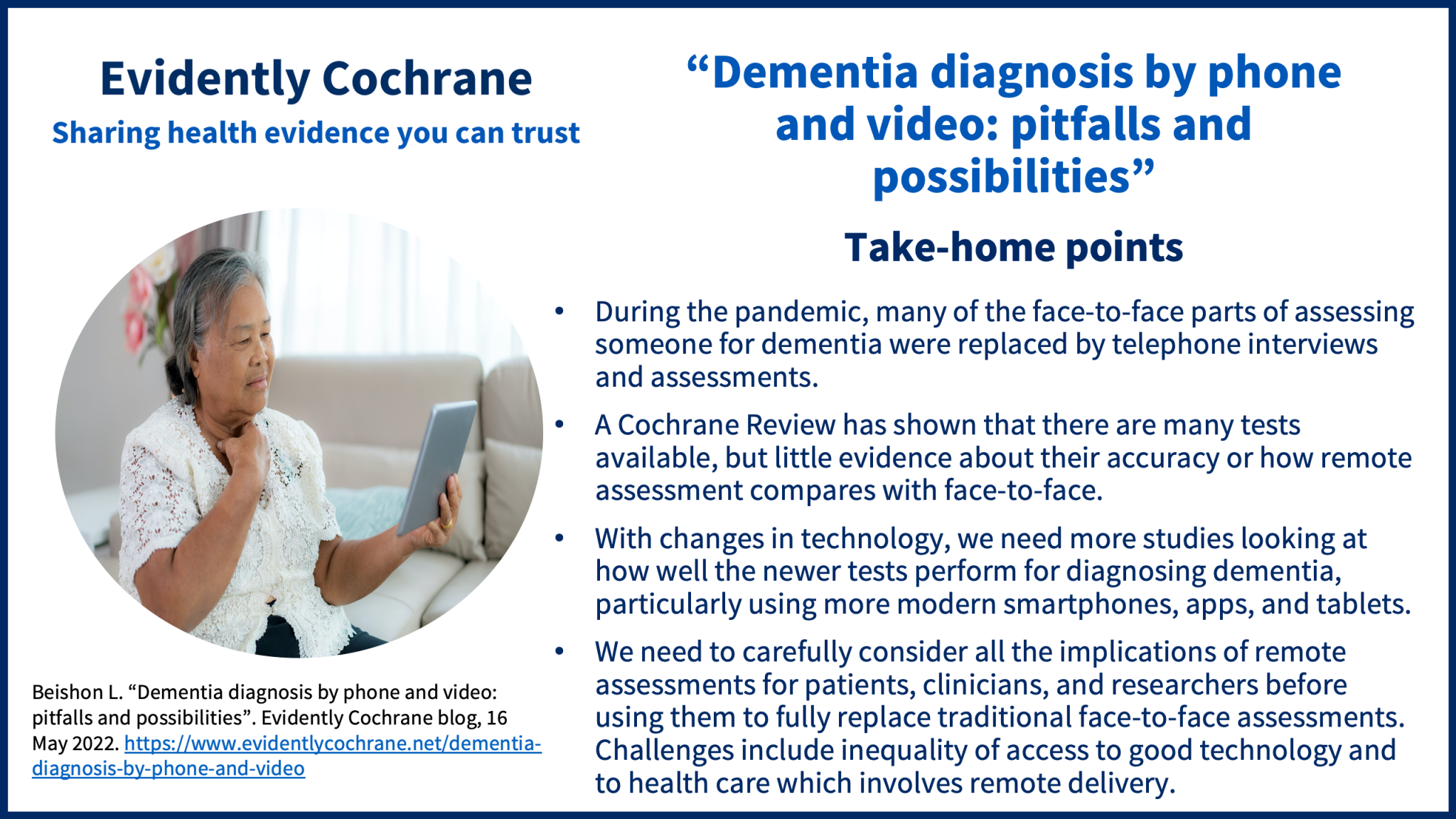The latest evidence and resources for nurses and clinical support staff. You can either scroll through this page or click on any of the links below to jump to the relevant section.
- COVID-19
- Assisted reproduction
- Asthma
- Bronchiolitis
- Care of the newborn, including preterm infants
- Chronic obstructive pulmonary disease (COPD)
- Dementia: remote assessment
- Discharge planning
- Eczema
- Mental health
- Pilonidal sinus
- Pressure ulcers (pressure injuries)
- Smoking cessation
- Subfertility
- News and opportunities
1a
COVID-19
Cochrane is continuing to produce new and updated reviews in response to the pandemic. We have blogged about many of them and this blog COVID-19 evidence: a Cochrane round-up brings together a large collection of evidence and resources, starting from when this evidence was first being produced in spring 2020.
Plus, we have two blogs on COVID-19 treatments:
Like the reviews themselves, all our blogs are updated to reflect new evidence.
Cochrane Special Collections
Cochrane Special Collections assemble Cochrane Reviews on important topics for the prevention and treatment of COVID-19. They are developed with experts from our global Cochrane network. They are based on World Health Organization interim guidance, and continuously updated.
You can find Coronavirus (COVID-19) Special Collections here including Coronavirus (COVID-19): infection control and prevention measures and Coronavirus (COVID-19): evidence relevant to acute and critical care which were updated in June 2022.
Cochrane Podcasts
Cochrane COVID-19 Podcasts offer short summaries of Cochrane COVID-19 reviews from the authors themselves. A good way to hear the latest Cochrane evidence in under 5 minutes each.
The collection includes the recent podcast Do blood thinners prevent people who are hospitalised with COVID-19 from developing blood clots?
Cochrane Clinical Answers
Cochrane Clinical Answers (CCAs) provide a readable, digestible, clinically-focused entry point to rigorous research from Cochrane Reviews. They are designed to be actionable and to inform point-of-care decision-making. Each CCA contains a clinical question, a short answer, and data for the outcomes from the Cochrane Review deemed most relevant to practising healthcare professionals.
Recent Cochrane Clinical Answers addresses these questions:
- What is the accuracy of World Health Organization (WHO)‐specified and related COVID‐19 symptoms for the diagnosis of COVID‐19?
- What are the effects of janus kinase (JAK) inhibitors for people with moderate to severe COVID‐19?
- You can find more Cochrane Clinical Answers related to COVID-19 here
2
Assisted reproduction
Cochrane Clinical Answer: In assisted reproductive technology, what are the effects of cleavage stage versus blastocyst stage embryo transfer?
3
Asthma
Digital technologies may help people with asthma adhere better to their treatment and improve asthma control, conclude the authors of the Cochrane Review Digital interventions to improve adherence to maintenance medication in asthma (June 2022). You can find out more in this article: Featured Review: Digital technologies to help people with asthma take their medication as prescribed.
4
Bronchiolitis
Cochrane Clinical Answer: How does parenteral compare with enteral fluid therapy for children hospitalized with bronchiolitis?
5
Care of the newborn, including preterm infants
Correcting hypoglycaemia in newborns
Cochrane Clinical Answer: How effective and safe is oral dextrose gel in correcting hypoglycemia in newborn infants?
Preventing necrotizing enterocolitis
Cochrane Clinical Answer: For very preterm or very low birth weight infants, do synbiotics prevent necrotizing enterocolitis?
6
Chronic obstructive pulmonary disease (COPD)
Health professional education
The authors of the Cochrane Review Educational interventions for health professionals managing chronic obstructive pulmonary disease in primary care (May 2022) conclude that “The evidence of efficacy was equivocal for educational interventions for health professionals in primary care on the proportion of COPD diagnoses confirmed with spirometry, the proportion of patients with COPD who participate in pulmonary rehabilitation, and the proportion of patients prescribed guideline‐recommended COPD respiratory medications. Educational interventions for health professionals may improve influenza vaccination rates among patients with COPD and patient satisfaction with care.”
Self-management
Cochrane Clinical Answer: What are the effects of self‐management for people with chronic obstructive pulmonary disease (COPD)?
7
Dementia: remote assessment
In the blog Dementia diagnosis by phone and video: pitfalls and possibilities, Lucy Beishon, specialist trainee in geriatric medicine and NIHR Academic Clinical Lecturer in Geriatric medicine, talks about evidence from her Cochrane Review Diagnostic test accuracy of remote, multidomain cognitive assessment (telephone and video call) for dementia (April 2022), reflects on her experiences during the pandemic, and looks to the future.
Discharge planning
Cochrane Clinical Answer: How does discharge planning affect outcomes in older adults with medical (non‐surgical) conditions?
8
Eczema
The Cochrane Review Strategies for using topical corticosteroids in children and adults with eczema (March 2022) explores the evidence on the effectiveness and safety of different ways of using topical corticosteroids for treating eczema. The authors found that:
- Potent and moderate topical corticosteroids are probably more effective than mild topical corticosteroids, primarily in moderate or severe eczema;
- The effects of very potent compared with potent topical corticosteroids are uncertain;
- Effectiveness is similar between once daily and twice daily (or more) frequent use of potent topical corticosteroids to treat eczema flare‐ups;
- Using topical corticosteroids proactively on two consecutive days a week is probably better than no topical corticosteroids/reactive use to prevent eczema relapse (flare‐ups);
- Adverse events were not well-reported and came largely from low‐ or very low‐certainty, short‐term trials.
Cochrane Clinical Answer: For children and adults with eczema, how does potent topical corticosteroid (TCS) compare with mild‐ or moderate‐potency TCS?
9
Mental health
Depression
Cochrane Clinical Answer: How do omega‐3 fatty acids compare with placebo for adults with depression?
Self-harm
Cochrane Podcast: Psychosocial interventions for adults who self-harm.
9
Pilonidal sinus
The Cochrane Review Dressings and topical agents for the management of open wounds after surgical treatment for sacrococcygeal pilonidal sinus (May 2022) highlights continued uncertainties about the effects of a range of dressings and topical agents on wound healing. There is low‐certainty evidence that there may be a beneficial effect on wound healing of platelet‐rich plasma from two studies and of Lietofix cream and hydrogel dressings from single studies.
10
Pressure ulcers (pressure injuries)
Blog: Pressure ulcers (pressure injuries): evidence and resources. On this page you can find Cochrane evidence on preventing and treating pressure ulcers (pressure injuries), including resources that aim to make it useful and accessible, as well as links to the reviews themselves.
11
Smoking cessation
Cochrane Clinical Answer: How do heated tobacco products (HTPs) and cigarette smoking compare in terms of safety?
12
Subfertility
A Cochrane Review Antioxidants for male subfertility (May 2022) has found low- and very low-certainty evidence that antioxidants may be associated with increased live births and clinical pregnancy rates, compared with placebo or no treatment. Of 67 studies included in the meta‐analysis, only 20 reported clinical pregnancy, and of those 12 reported on live birth.
They found that antioxidants may lead to an increase in mild gastrointestinal discomfort.Only six studies reported on miscarriage and the event rate was very low.
It remains uncertain how different antioxidants compare.
13
News and opportunities
A free course: How to talk about vaccines when you’re not an expert: a Lifeology and Cochrane collaboration.
Join in the conversation on Twitter with @SarahChapman30 and @CochraneUK or leave a comment on the blog.
Please note, we cannot give medical advice and do not publish comments that link to individual pages requesting donations or to commercial sites, or appear to endorse commercial products. We welcome diverse views and encourage discussion but we ask that comments are respectful and reserve the right to not publish any we consider offensive. Cochrane UK does not fact check – or endorse – readers’ comments, including any treatments mentioned.
Sarah and Selena have nothing to disclose.



